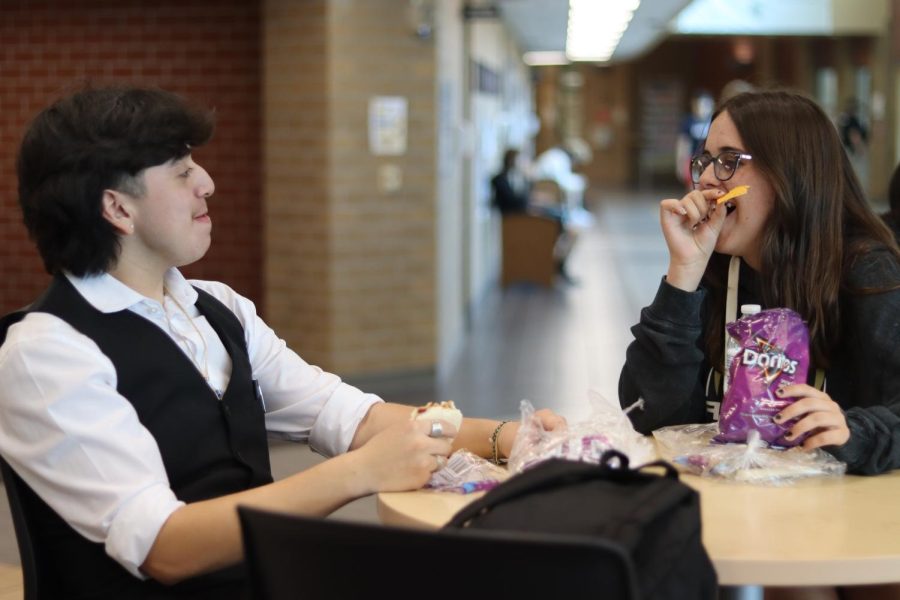Changes at Maize South cause frustration for students
Students at Maize South this year have been hit with many different policies and implementation changes that have left them confused and unsure.
Dacey Willson (11) and Eli Cruz-Quintero (11) eat lunch in the crowded lunch room at Maize South. While having to deal with changes in their daily routines at school, seeing their friends at lunch remains consistent.
September 9, 2022
Students at Maize South High School this year have been shocked by the changes that have been going on around the school. Whether it be new policies or implementation of old policies, students have definitely felt the difference in school this year, struggling to understand why these changes have been made.
To begin the year, students were informed that school would start five minutes early, therefore offsetting the schedule many were used to by five minutes every block. This change in start time, as many know already, was made to help lessen traffic getting into the school and to minimize the likelihood of students getting into a wreck before.
This policy was district-wide, with Maize High following the same change in schedule.
However, the goal of lessening the likelihood of wrecks has proven wrong at Maize South this year, with at least four wrecks occurring thus far.
Students this year were also surprised that there would be a new bell for students returning from the Maize Career Academy. Giving students that drive themselves no extra time than the bus to get back to Maize South, a bell comes onto the loudspeaker during every block informing them that “all students should now be in class.”
This chime is designed to ensure that students are in class when they are supposed to be and are not making additional stops on their way back to school.
The chimes are aggressive and they tend to cut off teachers midsentence.
— Vanessa Carey
With a focus on student safety this year, Maize South administration has changed the implementation of their hall pass policy to add another layer to ensuring students are where they are supposed to be at any given time.
Principal of Maize South, Becky Sailor, explains that the policy on hall passes has not changed since last year.
“How we are implementing it has changed because the policy on passes has been the same,” Sailor says. “No changes at all in the Student Handbook. But we, as a school, were not following the policy that’s in the Student Handbook and so we’re trying to do better as a school to make sure we’re following it.”
Pre-COVID and through the hybrid schedule in the 2020-2021 school year, Maize South had paper agendas to account for hall passes. According to Sailor, when asked about printing agendas earlier in the year, teachers felt it was not worth the money or the paper to print them and the new hall pass system was designed to account for that.
“If we still printed agendas, that’s what we would use as our pass system,” Sailor says “Kind of old school, but that actually has not changed at all, we’re just trying to get back to making sure that we’re implementing that appropriately.”
Although some students have differing opinions on the correct implementations of a pass system, senior Vanessa Carey would prefer the system of agendas rather than the current process.
“High school is the first time I’ve felt I needed an agenda to keep track of all my assignments,” Carey says. “I think they’d also help to get passes in advance, so you don’t have to rush last minute.”
Dress code at Maize South is a familiar topic among students and teachers alike. Since the last school year, some of the wording in the Student Handbook was changed to make the dress code more generalized and equal for all students. Certain items, such as the previous ban on racer-back tank tops, were removed with the addition of more general terms, like only wearing things meant to be worn as clothes to school.
Freshman Anna Doyon believes that Maize South Middle School had less strict rules than the high school on dress code, despite some restrictions being lifted this year.
“They were strict really only on showing your stomach; they didn’t really care about anything else,” Doyon says. “The only time I got dress coded is because I was wearing an inappropriate shirt that had beer on it.”
On top of all the changes already this school year, doorstops and door magnets are another thing changing at Maize South this year.
With a focus on safety this year, Maize South administration has been working to do everything they can to ensure that classrooms are as secure as possible. Door magnets, according to Sailor, make the school less safe.
It’s probably coming and it’s probably coming soon as far as removing magnets and figuring out how to work around the barriers of what that creates
— Becky Sailor
“The whole purpose of all our buildings having our Salto system is to be safe and create that barrier and when we put that magnet there, we’re taking away the exact thing that makes the barriers,” Sailor says.
Teachers, on the other hand, feel that doorstops and door magnets make the class environment easier and make students feel more welcome.
“It’s difficult to make connections with students if my whole responsibility is hold the door open the whole time; I just don’t like that policy,” social studies teacher William Vinduska says. ” I understand not keeping the door wide open during class. I like using the magnets because we have the SafeDefend thing which should signal me if there is a reason. Removing a magnet is a moment. It takes two seconds.”
Although the doorstop and door magnet does not directly affect students and has not currently been changed, there are likely to be decisions made about the policies in the coming weeks. These changes might make the classrooms more secure, but could also increase time spent opening the doors, which would make up for the time saved by the current pass system.
Students this year have struggled to understand the reasoning behind many of the policy and implementation changes, seniors feeling the impact in a different way than other grades.
“It feels we are held to the standards of adults, but we are being micromanaged more than at a job. Even if we have a pass we are prodded about where we are going. I don’t know how this is a preparation for life or college if we feel more strict than middle school.”




